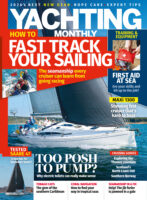The search for Dr Nenad Belic - whose attempt to row across the Atlantic began from Cape Cod on 16 May 2001 - has been abandoned
The search for the missing 62-year-old retired American cardiologist Dr Nenad Belic – whose attempt to row across the Atlantic began from Cape Cod on 16 May 2001 – has been abandoned.
The search began on Sunday after Dr Belic’s EPIRB was activated at 2130 on Sunday 30 September from a position 230 miles west of Ireland. An RAF helicopter, scrambled from Chivenor in Devon, located the beacon but there was no sign either of the boat or Dr Belic.
British and Irish long range reconnaissance aircraft were scrambled to conduct a wider search in the hope that the EPRIB had been washed off Dr Belic’s 21ft enclosed rowing boat The Lun. Their search was called off last night as conditions in the Atlantic deteriorated.
Dr Belic’s attempt began at 1330 on 16 May 2001 from Chatham, Cape Cod, bound for Ireland’s Bantry Bay. The first successful attempt along this route was completed in 1966 by John Ridgeway and Chay Blyth in English Rose III. In 1980, Gerard d’Aboville completed the crossing alone, as did Joseph Le Guen in 1995.
 Chicago-based Belic had been preparing for the crossing for eight years and had invested US$50,000 in his 21ft cold-moulded wood, GRP-sheathed rowing boat. The Lun – Serbo-Croat for ‘Moon’ was equipped with GPS, a satellite telephone and email, powered by batteries recharged by solar panels.
Chicago-based Belic had been preparing for the crossing for eight years and had invested US$50,000 in his 21ft cold-moulded wood, GRP-sheathed rowing boat. The Lun – Serbo-Croat for ‘Moon’ was equipped with GPS, a satellite telephone and email, powered by batteries recharged by solar panels.
On arrival in Cape Cod, Dr Belic claimed he contacted the US Coastguard about his attempt and they wished him well. US Coastguard has no record of that conversation and, after Dr Belic began his attempt, they diverted a Coastguard helicopter to intercept The Lun and conduct a safety inspection but were unable to locate the boat. Attempts to contact Dr Belic by email also failed.
Dr Belic, a US-naturalised Yugoslav married with four children, prepared for the attempt with two 300-mile passages from Chicago to Mackinac Island, encountering waves of up to eight feet and stiff winds. He believed these were representative of Atlantic conditions but was well aware that, since 1966, six lives have been lost in similar endeavours.
“My wife, she is a darling,” Dr Belic told the Cape Cod Chronicle before departure. “but she is not doing very well with this.” Asked about his chances, he believed there was a 50 percent chance he would reach Europe, a 48 percent chance he would have to turn back. “The risk of disappearing is about two percent,” said Dr Belic. “Life is hazardous.”
Kenneth Crutchlow of London’s Ocean Rowing Society advised that crossings scheduled to arrive in autumn should be avoided. “A rower does not want to be at sea in September, certainly not in October, and no way in November, so let’s hope he has a fast crossing.”
Before departure, Dr Belic was asked what motivated him to attempt this crossing. “It is a question to which there is no answer.”



